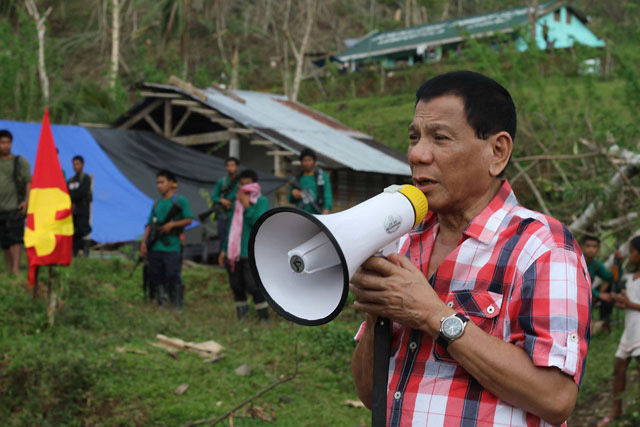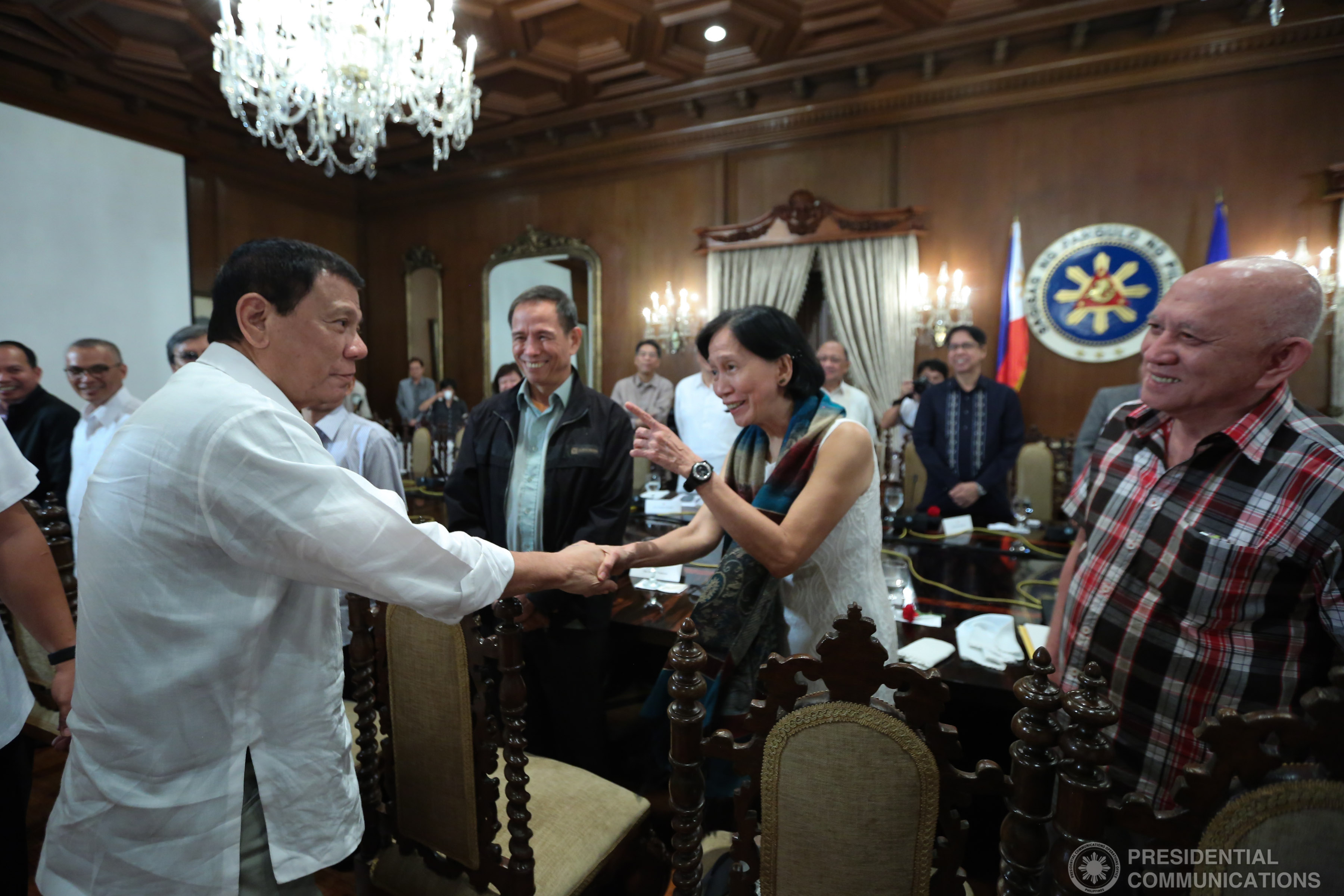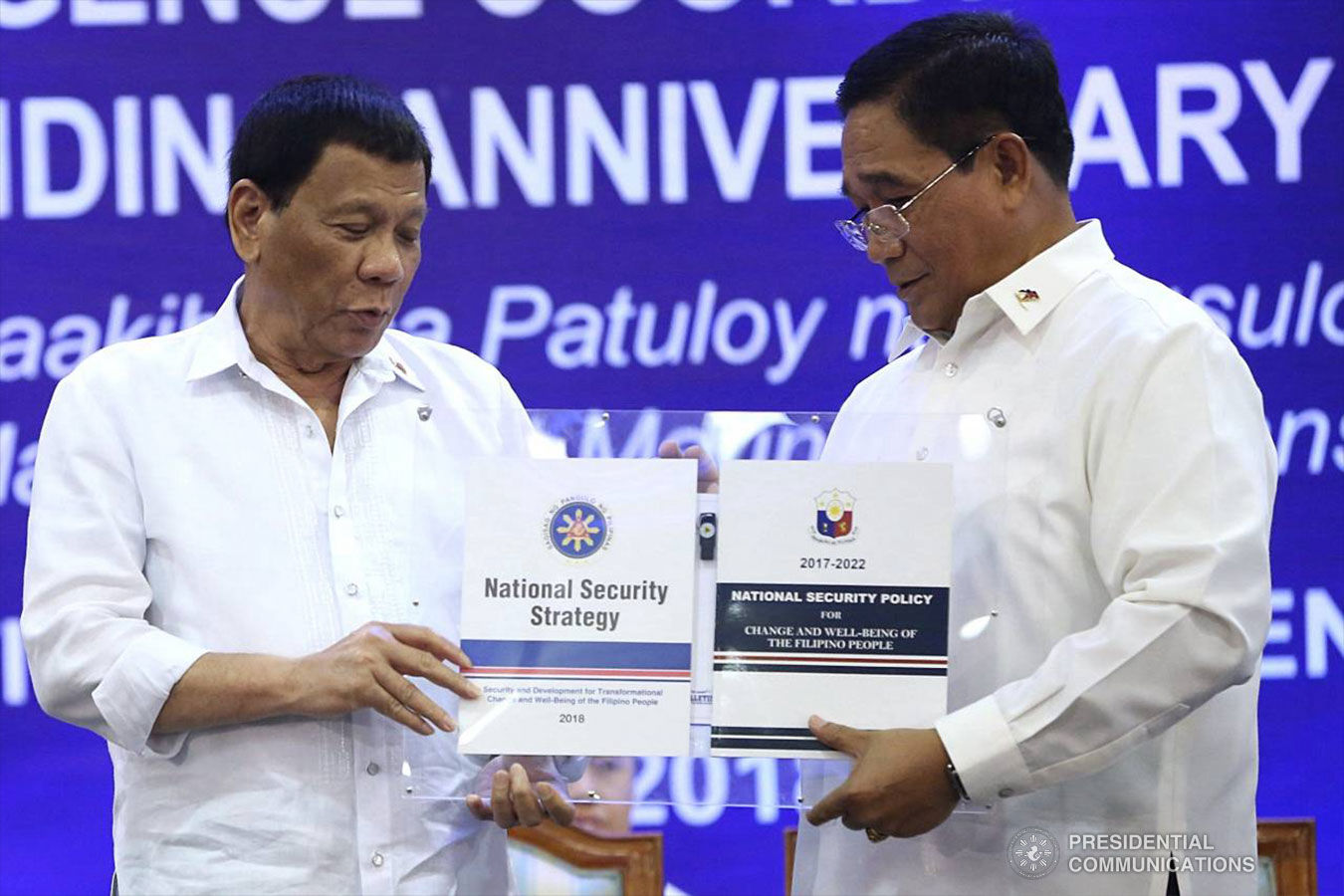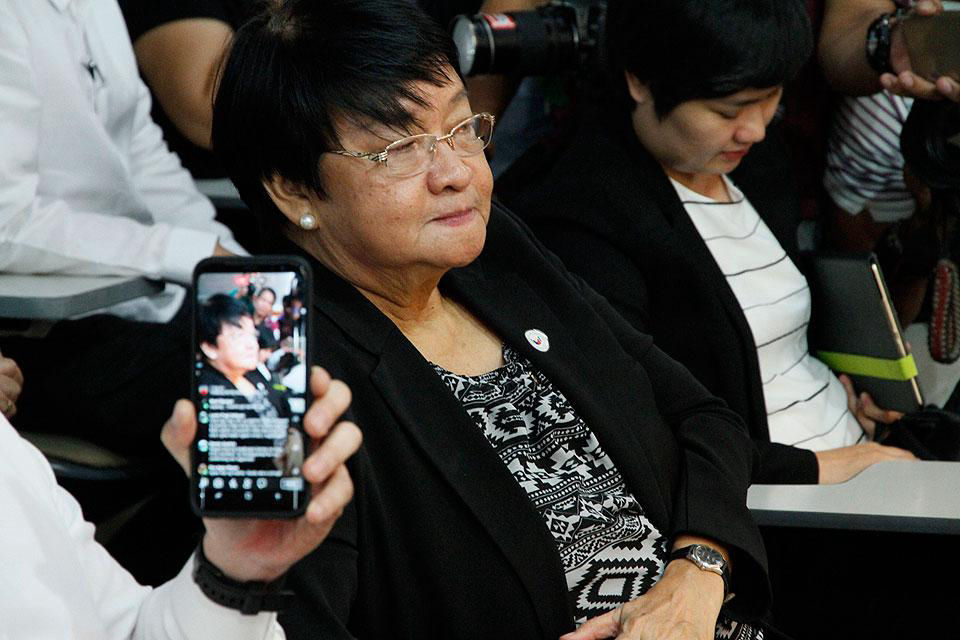We use cookies to ensure you get the best browsing experience. By continued use, you agree to our privacy policy and accept our use of such cookies. For further information, click FIND OUT MORE.
The Duterte administration began with the hope of potentially ending the decades-long Communist insurgency. Four years later, the prospects of peace have become as remote as ever.
By VIRGIL LOPEZ
December 27, 2020
In recent weeks, President Rodrigo Duterte has used his weekly addresses, supposedly to discuss the government response to COVID-19, to slam his critics. In particular, left-leaning groups have been the target of his ire, accusing them of being part of a Communist-driven “grand conspiracy” to overthrow the government.
There is nothing new about Duterte hitting out at Communist rebels and their alleged sympathizers. But this has been further amplified after the President recently alleged that groups such as the Makabayan bloc in the House of Representatives, Bayan and Gabriela are fronts of the Communist Party of the Philippines, its armed wing, the New People’s Army, and its political arm, the National Democratic Front (CPP-NPA-NDF).
The Makabayan bloc denied the President’s claim, dismissing it as a tactic to hide the government’s supposed incompetence in handling the country’s problems such as the COVID-19 crisis and an attempt to stifle dissent.
Ironically, the Makabayan bloc once belonged to the ruling coalition of the House of Representatives dominated by lawmakers loyal to Duterte.
This is simply the latest episode in the worsening relationship between Duterte and the Left — one that began with a lot of promise, so much so that it nurtured hope that peace would finally come after the decades-long Communist insurgency.

Rodrigo Duterte, at the time the vice mayor of Davao City, visits a guerilla zone of the New People's Army somewhere in Compostela Valley during the celebration of the 44th founding anniversary of the Communist Party of the Philippines on December 26, 2012. Duterte also delivered financial and material assistance to Typhoon Pablo survivors in the area. Photo: Karlos Manlupig
Not too long ago, Duterte and the Left enjoyed cordial relations, especially during his stint as mayor of Davao City, a one-time communist stronghold.
On some occasions, Duterte acted as an intermediary to ensure the release of people, including soldiers, held captive by the NPA.
For instance, the NPA released two soldiers to Duterte in November 2015 reportedly after the families asked for his help.
The President had also said he never allowed the military to torture captured communist rebels in Davao. In 2015, then-Mayor Duterte allowed a funeral march for slain rebel leader Leoncio “Commander Parago” Pitao.
Back as a college student in the 1960s, Duterte was a member of the militant youth group Kabataang Makabayan (KM), according to his political science professor, Jose Maria Sison, who later founded the CPP.
“I used to listen to Maria Sison. I listened because I thought that the world was a perfect place, that all your ideals should materialize,” Duterte said in a speech in Cagayan de Oro City in October 2018.
Duterte acknowledged his membership in KM days before the May 2016 presidential elections, but clarified that he never joined the CPP, which was established 52 years ago on December 26, 1968.
Sison, for his part, called the Duterte presidency the best chance for peace for the country.
When he ascended to Malacañang in June 2016, Duterte wasted no time using his authority to fulfill a campaign promise to reach a political settlement with the communist rebels.
He released some NDF consultants from prison, met with suspected NPA leaders Benito and Wilma Tiamzon in Malacañang, and appointed personalities endorsed by the CPP to his Cabinet and other government posts.
“President Duterte has shown magnanimity by offering government posts [to the Left],” Sison said at the time.
Benito Tiamzon, one of the NDF consultants who were released on bail, also hailed the government’s “goodwill measure” ahead of the resumption of the peace negotiations aimed at ending Asia’s longest-running insurgency that claimed the lives of thousands of Filipinos over the past five decades.
However, the good ties between the Duterte government and the Left would prove to be short-lived.

President Rodrigo Duterte shares a light moment with Wilma Tiamzon, National Democratic Front (NDF) consultant, in a meeting held in Malacañang on September 26, 2016 as fellow NDFP consultants Benito Tiamzon and Fidel Agcaoili look on. KING RODRIGUEZ/PPD
Peace negotiations between the government and communist rebels collapsed in November 2017 after Duterte lamented what he said were continued attacks by rebels on troops and civilians.
He tagged the CPP and NPA as terrorist organizations, although the government has yet to secure a court declaration to officially outlaw the groups.
The NDF expressed disappointment over Duterte's decision to end the peace talks with them, saying that social and economic reforms that may result from these could have benefited millions of Filipinos.
“President Duterte bears full responsibility for the failure of the talks on social and economic reforms because of his sudden turn-around and heightened hostility to the revolutionary forces and the people,” it said.
The administration has since moved for the arrest of NDF consultants who were temporarily released from jail to participate in the peace talks, including the Tiamzons who were found guilty last month by a Quezon City court for the abduction of four soldiers in 1988.
Meanwhile, leftist Cabinet members Judy Taguiwalo and Rafael Mariano failed to clinch the support of the powerful Commission on Appointments, a body composed of select congressmen and senators, also in 2017. Former Gabriela party-list Representative Liza Maza resigned as National Anti-Poverty Commission chief in August 2018 over the cancellation of the peace talks.
Reacting to Taguiwalo's rejection by the CA, Sison accused the administration of becoming “more reactionary and servile to anti-national and anti-democratic interests.”
In November 2017. Duterte announced that he would end peace talks, blaming continued attacks by Communist rebels. The NDF, however, viewed it as an effort by the administration to muzzle criticism.
But for University of the Philippines political science professor Maria Ela Atienza, the Left should have ended its alliance with Duterte sooner. She sees as the tipping point the decision of the President to allow the remains of the late dictator Ferdinand Marcos, who imposed Martial Law supposedly to save the country from Communist insurgents, to be buried at the Libingan Ng Mga Bayani in 2016.
Other warning signs, Atienza said, were the rising number of deaths as a result of the war on drugs, Duterte’s “misogynistic rants,” and the President’s pivot to China “at the expense of our claims to disputed territories and the rights of Filipino fisherfolk.”
“President Duterte's relationship with the Left turned sour because from the very beginning, there were too many differences between the principles of the radical Left groups with the President and other allies in the Cabinet and the legislature,” she said.
“It was just a strategy of the President and his allies to show at the beginning that his administration has ‘progressive’ intentions when in reality, this is not the case,” Atienza said.
Malacañang, however, insisted that Duterte was sincere in seeking peace with the communist insurgents.
“The appointment of the allies of the Makabayan bloc to the Cabinet showed the President’s willingness to work with all Filipinos,” presidential spokesperson Harry Roque said.
“But the President also raised these points: When will the fighting stop? Why can’t they lay down their arms and just pursue their objectives instead in Congress and through legal means?

National Security Adviser Hermogenes Esperon Jr. (right), shown here at a 2018 event with President Rodrigo Duterte, believes the NTF-ELCAC is an alternative to peace talks. TOTO LOZANO/PPD
One political analyst, however, believes the government felt betrayed by the moves of the insurgents after concessions made by the Duterte administration.
“I think Duterte felt ‘na-onse’ (deceived). The Left got what they want – Cabinet posts, their jailed leaders freed, [and] international recognition but the NPAs continued with their attacks and recruitment and Duterte must have realized that peace talks are a waste of time,” Eduardo Araral, associate professor at the National University of Singapore’s public policy school, said when asked what led to Duterte's soured relations with the Left.
Dennis Coronacion, chair of the University of Santo Tomas political science department, echoed that view.
“This seeming lack of sincerity and commitment to the peace process on the part of the communist group resulted in President Duterte's frustration,” he said.
In response, Sison placed blame squarely on Duterte, saying it was the President who negotiated “in bad faith.”
“Since coming to power, he had taken an all-out war policy against the armed revolution led by the CPP under the pretext of letting the AFP [Armed Forces of the Philippines] continue [former President Benigno III] Aquino's Oplan Bayanihan [counter-insurgency campaign]," Sison told GMA News Online.
The NDF chief political consultant said it was the military which violated the ceasefire but “unjustly accusing the NPA of doing the attack.”
Duterte also “consistently reneged on his promise to release all political prisoners despite his release of only 22 NDFP consultants,” he added.
In December 2019, President Rodrigo Duterte challenged CPP-NPA founder Jose Maria Sison to "one on one" talks. Sison brushed off the challenge, saying government and NDF panels need to hammer out agreements first.
Coronacion said that Duterte’s apparent change of heart can also be explained by “his need to secure the support of the military to ensure the government's survival and continuity.”
“Although the 1987 Constitution indicates that the Philippine military should be apolitical, its actual behavior says otherwise as evidenced by the considerable number of coup attempts against the civilian governments after EDSA 1 as well as the significant role that its leadership played in ousting President [Joseph] Estrada [in January 2001],” he said.
“Not even the popularity of former President Estrada could save his government when AFP's leadership threw its support [behind] the opposition during EDSA 2.”
Coronacion said: “Given the vulnerable position that the Philippine presidents have found themselves in, no one among them would be willing to stick with the policy of inclusivity which would allow Left-leaning groups to have a stronger voice in policy-making and implementation.”
After Duterte stopped the centralized negotiations, he shifted his strategy to localized peace talks even as he maintained offensive police and military operations against the rebel forces.
For 2021, the government is expected to spend P19 billion for the anti-insurgency program under the National Task Force to End Local Communist Armed Conflict (NTF-ELCAC), a multi-agency body which is now at the center of a controversy over the alleged red-tagging of leftists and other individuals.
Bulk of the budget or P16.4 billion will be used to support development projects for 822 barangays cleared of “communist terrorist threat.” These projects include farm-to-market roads, school buildings, water and sanitation systems, electrification, connectivity, and raising of livestock, crops and fisheries.
Makabayan lawmakers have described the NTF-ELCAC allocation as akin to pork barrel for the military, and have tried to block funding for the task force, to no avail.
NTF-ELCAC vice chairperson and National Security Adviser Hermogenes Esperon Jr., for his part, sees the program as an alternative to peace talks with CPP-NPA-NDF leadership.
“We are now pursuing local peace engagements which have resulted in understanding and the mainstreaming of rebels,” said in January.
“Moreover, the government has the capacity to fulfill its obligations for social justice and development. Who needs the CPP-NPA-NDF?”
Esperon argued that the peace talks were only used by the rebels as an opportunity to rest when badly beaten, seeking reinforcements, and initiating recruitment.
In a televised address in April 2020, Duterte accused the New People's Army of killing soldiers on humanitarian missions amid the COVID-19 crisis.
Despite reservations from some quarters within his government, Duterte sent Labor Secretary Silvestre Bello III to the Netherlands in December 2019 to speak with NDF officials including Sison, calling the initiative his “last card.”
The President even challenged Sison to come home for a one-on-one talk and assured the latter that he will not be arrested, but the CPP founder preferred to meet with Duterte in a country near the Philippines after the formal resumption of the peace talks and the mutual approval of the Interim Peace Agreement.
Needless to say, Duterte’s overtures to the rebels a year ago failed to produce tangible results.
In April this year, the President said that he would “never be ready for any round of talks” as he accused the NPA of killing soldiers on humanitarian missions amid the COVID-19 crisis.
On December 7, the President declared that there will no longer be any ceasefire between the government and the CPP-NPA until the end of his term in June 2022.
In a tit-for-tat move, the CPP dispensed with the “traditional” holiday ceasefire this year “in the face of the vicious attacks by Duterte's military and police forces both in the cities and countryside.”
With no signs of a thaw in relations, Coronacion thinks there is no chance for the government and the rebels to return to the negotiating table in the remaining 18 months of the Duterte administration.
“There are several studies indicating that the Communist threat in the country should not be taken seriously as the numbers of the Communist insurgents have not increased significantly. Given this, I think that the opposing parties are using the confrontation to further their own agenda,” he said.
“For the Communist insurgents, to show that they remain as a force to reckon with in Philippine politics and to gain public sympathy and support. For the military, the specter of Communism can be a good justification for budget increase.”
Araral believes the administration will take a more aggressive approach to keep the insurgency at bay.
“I think the government will go hammer and tongs in the last two years to significantly weaken the CPP-NPA-NDF and their legal fronts. Then Duterte can offer peace talks to a weakened movement which has no more negotiating leverage and then Duterte can declare that he has ended the world’s longest-running insurgency,” he said.
“This hammer and tongs approach has to be complemented more seriously to address the legitimate/proximate grievances that’s fueling the insurgency – lack of education, health, roads, jobs, poverty, and abuses by the mining/logging companies against the Lumads.”

Judy Taguiwalo watches from the sidelines of her confirmation hearing on Wednesday, August 16, 2017. The Commission on Appointments, after a lengthy deliberation, rejected her confirmation as DSWD secretary. Romeo Bugante/PRIB
For Atienza, however, the Duterte government had already missed the opportunity “to genuinely address the root causes of the insurgency, which include poverty, social inequality, and human rights abuses.”
“The continued red-tagging of opposition figures and critics, passage of the Anti-Terrorism Act, human rights violations, and continued military attacks in areas associated with the insurgency do not inspire any possibility for this administration to turn around and find a new way of solving the insurgency given it has less than two years to do anything,” she added.
Taguiwalo, who was social welfare secretary from June 2016 to August 2017, lamented that the quest for peace “has been rejected for a militarist approach to an armed conflict engendered by widespread poverty and social injustice.”
“And with the rejection of the peace process, we now have extensive human rights violations and repression of activists and critics of the administration,” she told GMA News Online.
Was the Duterte-Left alliance a mistake? Taguiwalo replied, “No.”
“There was the opportunity to be in government after decades of activism demanding that the government be responsive to the needs of the people. No because at the time we served the government, the President pursued peace talks [and] dialogued with marginalized sectors,” she said.
She said she was glad to have had the chance to serve and leave the government with her integrity intact.
“But I feel deep sorrow and disappointment that the promised change of an end to elite rule, an end to war, an end to a subservient foreign policy, an end to the exploitation of our workers, our farmers, our indigenous peoples, our migrant workers, our women and our environment had not happened,” Taguiwalo said.
Editing by Karl Kaufman, Raffy Jimenez